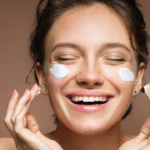Complete Skincare Guide Skincare is no longer just about cleansing your face—it’s a holistic approach to maintaining your skin’s health, glow, and youthfulness. Whether you’re battling teenage acne or navigating the signs of aging, this guide offers a comprehensive look into how to care for your skin at every stage of life.
With insights into skin types, effective routines, targeted treatments, and age-specific skincare, this guide will help you build a routine that evolves with you. Let’s decode the journey from acne to anti-aging.
Understanding Your Complete Skincare Guide

What Determines Skin Health?
Skin health is influenced by:
- Genetics
- Hormonal balance
- Environment and pollution
- Diet and hydration
- Sleep and stress levels
- Skincare habits
Identifying Your Skin Type
Knowing your skin type is the foundation of effective skincare. The main types are:
- Oily – prone to acne and shine
- Dry – tight, flaky, or rough
- Combination – oily T-zone with dry cheeks
- Sensitive – easily irritated
- Normal – balanced, rarely breaks out
Acne: The Beginning of Skincare Challenges
What Causes Acne?
Acne is primarily caused by clogged pores due to:
- Excess oil (sebum) production
- Dead skin cells
- Bacterial buildup (P. acnes)
- Hormonal fluctuations
- Diet (high-glycemic foods, dairy)
Acne Types
- Whiteheads and blackheads – clogged pores
- Papules and pustules – inflamed red bumps
- Nodules and cysts – deeper, painful acne
Effective Acne Treatments
Over-the-Counter Options
- Salicylic acid – exfoliates and unclogs pores
- Benzoyl peroxide – kills acne-causing bacteria
- Niacinamide – reduces inflammation
Prescription Medications
- Topical retinoids – increase cell turnover
- Antibiotics – reduce bacteria
- Oral contraceptives – balance hormones
- Isotretinoin – for severe, resistant acne
Lifestyle Tips
- Avoid over-washing the face
- Change pillowcases frequently
- Keep hair and hands off your face
- Stay hydrated and eat skin-friendly foods
Building a Skincare Routine
The Basic Routine
Morning
- Cleanser – gentle, pH-balanced
- Toner (optional) – balances skin, preps for serums
- Serum – Vitamin C for brightening
- Moisturizer – locks in hydration
- Sunscreen – broad-spectrum SPF 30+
Evening
- Cleanser – removes makeup and dirt
- Toner or exfoliant – AHAs or BHAs (1–2 times/week)
- Treatment serum – retinol, peptides, or acne treatments
- Moisturizer or night cream
- Eye cream (optional)
Weekly Additions
- Face masks – clay (for oily skin), hydrating (for dry)
- Exfoliation – physical scrubs or chemical exfoliants
- Facial massage – boosts circulation and reduces puffiness
Skincare in Your 20s: Prevention and Protection
Focus Areas
- Oil control and acne prevention
- Sun protection
- Establishing consistent routines
Recommended Products
- Lightweight moisturizers
- Niacinamide serums
- Chemical exfoliants (once or twice a week)
- SPF 30+ sunscreen, daily
Skincare in Your 30s: Early Signs of Aging
Focus Areas
- Fading hyperpigmentation
- Boosting collagen
- Preventing fine lines
Key Ingredients
- Retinol – boosts cell turnover
- Peptides – supports skin structure
- Antioxidants – fights free radicals
- Hyaluronic acid – boosts hydration
Skincare in Your 40s and Beyond: Anti-Aging Essentials
Common Changes
- Decreased elasticity
- Dullness
- Fine lines and wrinkles
- Age spots
Must-Have Ingredients
- Retinoids – prescription-strength if tolerated
- Ceramides – restore skin barrier
- Vitamin C – brightens and fades dark spots
- SPF 50+ – protect against further damage
Professional Treatments
- Chemical peels – resurfacing for smoother skin
- Microneedling – boosts collagen
- Laser therapy – pigmentation and wrinkle reduction
- Botox/fillers – for deeper lines and volume loss
Special Skincare Concerns

Hyperpigmentation
Caused by sun damage, acne scarring, or hormonal changes. Treat with:
- Vitamin C
- Azelaic acid
- Kojic acid
- Niacinamide
- Sunscreen (essential!)
Dry or Dehydrated Skin
Look for:
- Hyaluronic acid
- Glycerin
- Ceramide creams
- Avoid alcohol-based products
Rosacea and Sensitivity
Tips:
- Use fragrance-free, gentle products
- Avoid exfoliants and retinoids unless guided by a dermatologist
- Try anti-inflammatory ingredients like green tea and licorice extract
Natural and DIY Skincare: Do They Work?
Some natural ingredients offer benefits:
- Aloe vera – soothes inflammation
- Green tea – antioxidant and calming
- Honey – antibacterial and hydrating
- Turmeric – brightening
Caution: Not all natural remedies are skin-safe. Patch test and avoid using essential oils directly on skin.
The Role of Diet and Lifestyle in Skincare
Foods That Support Healthy Skin
- Omega-3 fatty acids (salmon, chia seeds)
- Antioxidant-rich fruits and vegetables
- Green tea
- Probiotics (yogurt, kefir)
Habits for Glowing Skin
- 7–9 hours of quality sleep
- Stress reduction (meditation, exercise)
- Staying hydrated
- No smoking or excessive alcohol
Men’s Skincare: What’s Different?
Men typically have thicker, oilier skin and may shave daily. A men’s routine should include:
- Gentle cleanser and exfoliant
- Lightweight, non-comedogenic moisturizer
- Post-shave soothing products
- Daily sunscreen
Skincare Myths Debunked

“You don’t need sunscreen on cloudy days.”
False. UV rays penetrate clouds and cause damage.
“Oily skin doesn’t need moisturizer.”
Wrong. Skipping moisturizer can trigger more oil production.
“Natural products are always better.”
Not necessarily. Some can irritate skin or be ineffective without proper formulation.
When to See a Dermatologist
If you experience:
- Persistent or severe acne
- Rapid signs of aging
- Unusual pigmentation or moles
- Skin conditions like eczema, psoriasis, or rosacea
A dermatologist can customize treatments to your needs, including prescriptions and procedures.
Also Read : 10 Secrets To Achieving Glowing Skin Naturally
Conclusion
Taking care of your skin is a lifelong journey—from teenage breakouts to mature skin concerns. Understanding your skin type, using evidence-based ingredients, and adapting your routine as you age will help you maintain healthy, radiant skin. Prevention, consistency, and informed choices are the cornerstones of effective skincare.
Whether you’re just starting with acne care or optimizing your anti-aging routine, the key is simple: be gentle, be consistent, and protect your skin daily.
FAQs
What is the most essential skincare step?
Sunscreen is the most critical. It protects against aging, pigmentation, and skin cancer.
Can I use the same products in the morning and night?
Some, yes (like cleansers and moisturizers). However, treatments like retinol should only be used at night, and SPF should be used only in the morning.
How soon will I see results from a new routine?
Usually in 4–6 weeks. Some treatments (like acne or anti-aging serums) may take up to 12 weeks.
Can I mix active ingredients?
Caution is needed. Avoid mixing retinol with vitamin C, benzoyl peroxide with retinoids, or exfoliating acids together. Use them at different times of the day or on alternate days.
Is it too late to start an anti-aging routine in my 40s?
Not at all. While prevention is ideal, treatments like retinoids, peptides, and professional procedures can still yield significant improvements.




